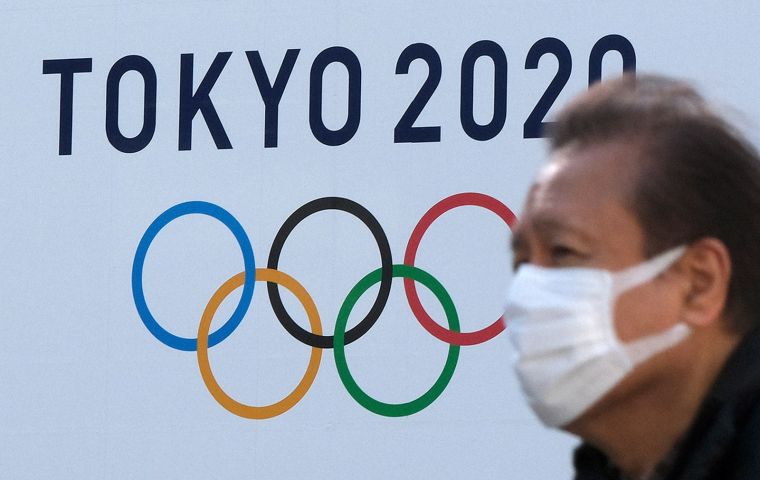MercoPress. South Atlantic News Agency
New state of emergency leaves Tokyo Games with no spectators
 “We need to step up virus prevention measures,” particularly the Delta strain, Prime Minister Suga said.
“We need to step up virus prevention measures,” particularly the Delta strain, Prime Minister Suga said. Organizers of the Tokyo 2020 Olympic Games which were postponed last year due to the coronavirus pandemic, Thursday announced there will be no spectators allowed when competitions take place.
Meanwhile, Japanese authorities have also decreed a new state of emergency in light of the increasing number of covid-19 cases.
However, a small number of fans will be allowed at the northeastern prefecture of Fukushima where baseball competitions are to be played. The area is not reached by the Government's limitations.
The state of emergency begins July 12 and runs through Aug. 22. The Olympics, which open July 23 and run through Aug. 8, fall entirely under the emergency period, while the Paralympics open Aug. 24.
“Taking into consideration the impact of the delta strain, and in order to prevent the resurgence of infections from spreading across the country, we need to step up virus prevention measures,” Japanese Prime Minister Yoshihide Suga said.
Under the present conditions, the Olympics will be a largely TV-only event. Suga's decision was backed by the International Olympic Committee, the International Paralympic Committee, and the metropolitan government of Tokyo in what was a serious blow to Japanese taxpayers with hundreds of millions of dollars in ticket revenues lost.
Organizers had expected to generate about US $800 million in ticket sales. Any shortfall — and it could be almost the entire amount — will have to be made up by Japanese government entities. Fans from abroad had already been banned months ago, and the new measures mean no local spectators at both indoor and outdoor venues.
In principle, the July 23 opening ceremony at the new US $1.4 billion US National Stadium will be without paying fans, although some dignitaries, sponsors, IOC officials and others will be allowed to attend.
“We will have to review the situation about the dignitaries and stakeholders,” organizing committee President Seiko Hashimoto said of the opening ceremony. “No fans was a very difficult decision,” she added. Hashimoto acknowledged some regrets, particularly about the decision coming so late.
“We had no choice but to arrive at the no-spectator decision,” she said. “We postponed and postponed, one after another. I have done some soul-searching about that.”
“What can I say? Finally we are here,” said IOC President Thomas Bach during a virtual meeting from his Tokyo hotel where he was self-isolating for three days after landing in the Japanese capital Thursday. “I have been longing for this day for more than one year.”
Japan is officially spending US $15.4 billion on the Olympics, and several government audits say it's much larger. All but US $6.7 billion is public money.
Two weeks ago, organizers and the IOC allowed venues to be filled to 50 per cent of capacity, with crowds not to exceed 10,000. The state of emergency forced the late turnaround, which was always an option if infections got worse.
The infections are in their expansion phase and everyone in this country must firmly understand the seriousness of it.- Dr. Shigeru Omi, top Japanese medical adviser The main focus of the emergency is a request for bars, restaurants and karaoke parlors serving alcohol to close.
A ban on serving alcohol is a key step to tone down Olympics-related festivities and keep people from drinking and partying. Tokyo residents are expected to face requests to stay home and watch the games on TV.
“How to stop people enjoying the Olympics from going out for drinks is a main issue,” Health Minister Norihisa Tamura said.
The rise in infections also has forced the Tokyo city government to pull the Olympic torch relay off the streets, allowing it only on remote islands off the capital's coast.
The Olympics are pushing ahead against most medical advice, partially because the postponement stalled the IOC's income flow. It gets almost 75 per cent from selling broadcast rights, and estimates suggest it would lose US $3 billion to US $4 billion if the Olympics were canceled altogether.
About 11,000 Olympians and 4,400 Paralympians are expected to enter Japan, along with tens of thousands of officials, judges, administrators, sponsors, broadcasters and media. The IOC says more than 80 per cent of Olympic Village residents will be vaccinated. Only 15 per cent of Japanese are fully vaccinated.
Ryuji Wakita, director-general of the National Institute of Infectious Diseases, noted that two-thirds of Japan’s cases are from the Tokyo region and “our concern is the spread of the infections to neighboring areas.”




Top Comments
Disclaimer & comment rulesCommenting for this story is now closed.
If you have a Facebook account, become a fan and comment on our Facebook Page!